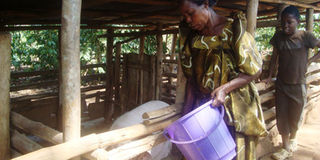Panic as African swine fever hits Masaka District again

Threat. A pig farmer feeds her animals in Masaka District. Such farms are under great risk over an outbreak of the African swine fever. FILE PHOTO
What you need to know:
- In 2015, pig farmers in the district also suffered an outbreak of African swine fever especially in Kabonera Sub-county and areas such as Kabonera ‘B’, Kiziba, Kasanje and Kyamuyimbwa and parts of Rakai District.
- Local farmers can manage the disease through confining their herds, restricting their movements, bury carcasses of the infected pigs, and carry out preliminary disinfection by spraying the premises.
The pig farmers in Masaka District are counting losses following an outbreak of African swine fever that has claimed a number of animals in the area.
The African swine fever is a contagious and infection disease that spreads rapidly among pigs. It is passed on to the pigs in a vicious cycle between soft ticks and wild pigs and direct contact with infected pigs.
According to Masaka District Veterinary Officer, Dr Kirumira Mukasa, some cases of swine fever have been reported in Buwunga Sub-county where farmers have lost scores of pigs.
“We are yet to establish the exact number of pigs that have so far died in the past one week, the disease has also been reported in neighbouring districts of Bukomansimbi, Sembabule and Lwengo and we are working jointly with authorities to contain it,” he said during an interview over the weekend
He said the disease is dangerous since it causes sudden death of the animals.
Dr Mukasa explained, that, an infected pig shows signs of high fever, loss of appetite and laboured breathing. “Between two to three days, the animal completely loses strength to stand due to paralysis in the legs,” he added.
He said they have deployed a surveillance team of veterinary extension workers to sensitise the affected communities.
“I ask farmers to immediately report to veterinary officers in their areas when they see these symptoms in their animals,” he added.
He also urged the public to avoid eating pigs that have died because of the contagious swine fever since it may lead to spread of the disease.
Mr John Kayita, a pig farmer in Buwunga Sub-county, one of the areas where African swine fever has been reported, warned fellow farmers against letting their pigs wander from village to village because they may contract the disease.
“Farmers should also properly clean the sties on a daily basis on top of using disinfectants to clean their pigs’ feeding utensils,” he said.
When contacted, Mr Charles Ssewanyana, the chairperson Greater Masaka Multi-Stake Pig Association, said they are scared that the outbreak could wipe out their animals and asked government to swiftly intervene.
“We ask farmers to adhere to the set preventive precautions by the veterinary office if we are to control the spread of the disease,” he said.
Mr Samuel Ssemwanga, a pork seller at Ssaza Trading Centre, asked the district veterinary officers to monitor the slaughter places of pigs so that the pork can be stamped to prove that it is not infected with any disease.
In 2017, swine fever broke out in Masaka, killing more than 300 pigs at one farm in Mwalo Village, Kimannya/Kyabakuza Division.
In 2015, pig farmers in the district also suffered an outbreak of African swine fever especially in Kabonera Sub-county and areas such as Kabonera ‘B’, Kiziba, Kasanje and Kyamuyimbwa and parts of Rakai District.
Control Measures
Local farmers can manage the disease through confining their herds, restricting their movements, bury carcasses of the infected pigs, and carry out preliminary disinfection by spraying the premises.
Piggery is a major farming activity in Uganda and one of the main sources of economic livelihoods for many households involved in the sector. Masaka is the leading producer of pigs in Uganda followed by Kamuli District, according to Dr Kirumira.




